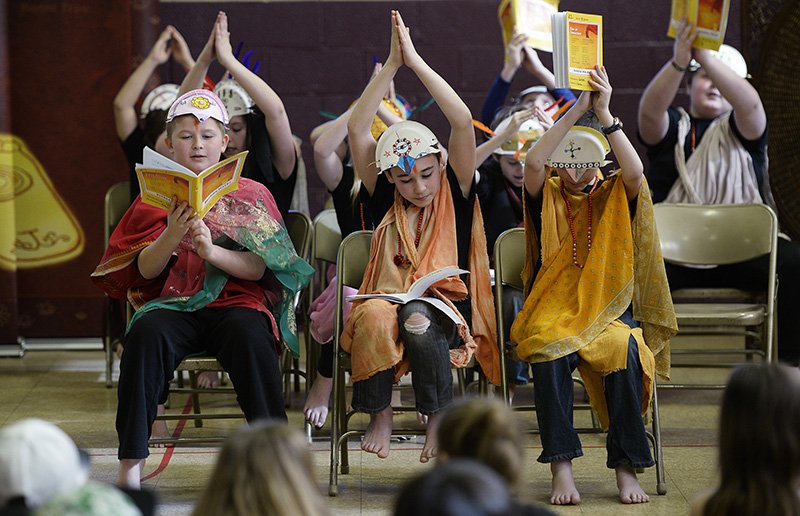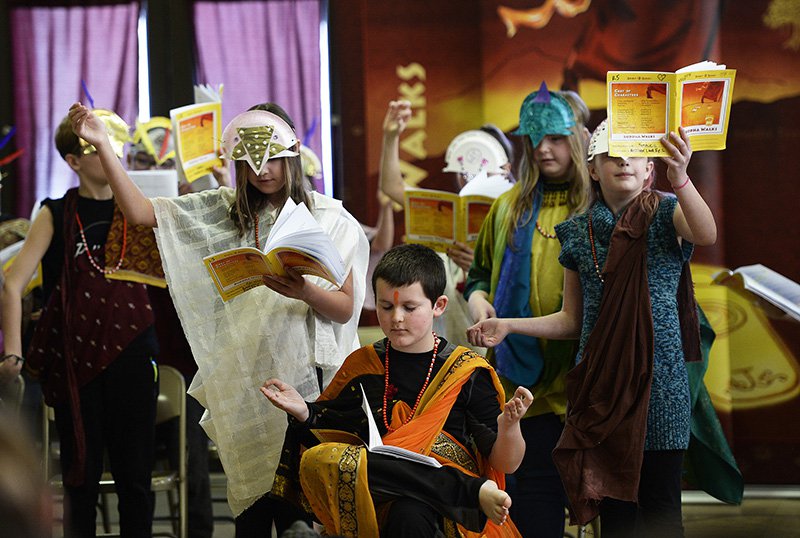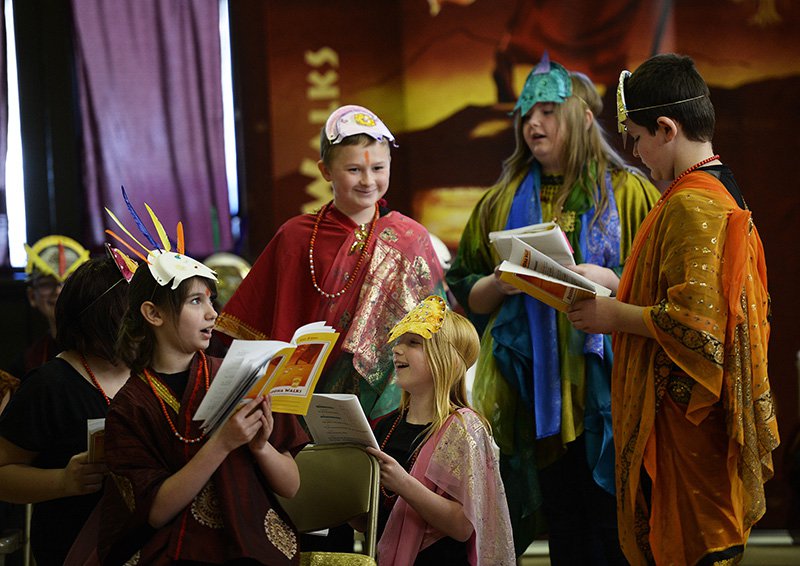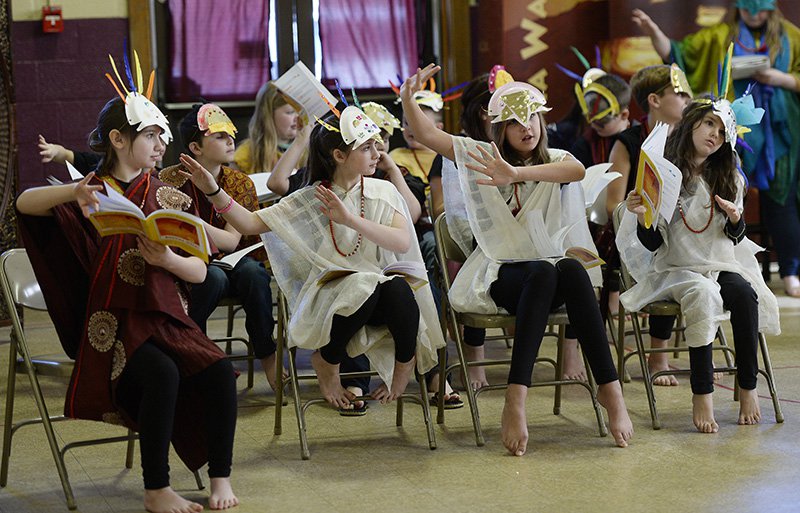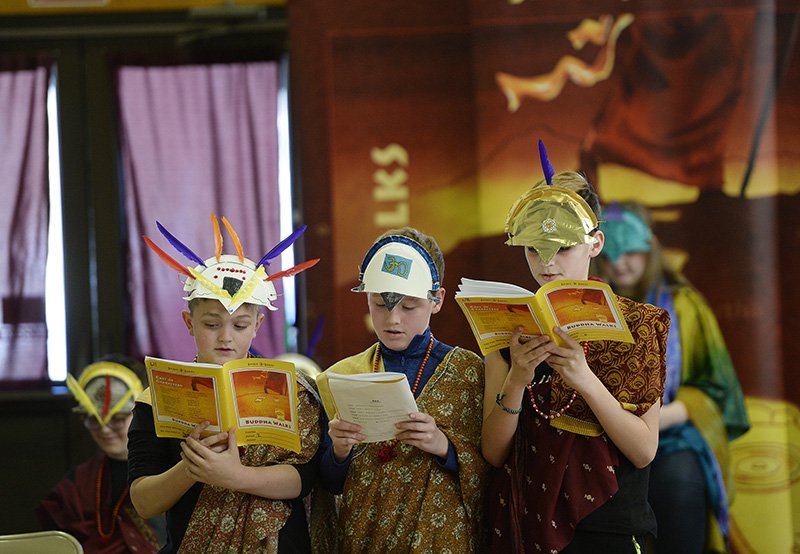LEBANON — Richard Strauss was working as a screenwriter in Los Angeles when real life intervened. His wife died from breast cancer, and his 10-year-old daughter had questions.
Coping with his own loss, Strauss used his skills as a storyteller to help support his daughter through her grief-filled personal journey. In doing so, he also found a new calling far outside his professional realm. Strauss, who lives in California, began an artist-in-residency public school program called Spirit Series, which presents stories about heroes from the past who faced adversity with integrity, courage and selflessness.
The drama-based program is predicated on the idea that children are better able to handle adversity in their own lives by learning from the wisdom of real-life people like the Lakota chief Sitting Bull, abolitionist Harriet Tubman and the spiritual leader Buddha, who overcame early challenges and shaped the future of their people and, in the case of the Buddha, much of mankind. Strauss turned their stories into short plays and began using them as learning tools to teach kids his daughter’s age about being mindful of others and leading responsible lives. The program has been offered in Maine for three years.
“This began as parenting issue, not an educational issue,” Strauss said in a phone interview. “I was a concerned parent. I knew what I wanted to convey to my daughter, and I also knew how to tell stories well and to communicate with kids her age.”
Strauss began Spirit Series 15 years ago in California. As the project gained traction on the West Coast, he expanded to New England because of personal ties. He hired fellow screenwriter and friend Kent Pierce of Yarmouth to launch the series in Massachusetts and later in Maine. Pierce is the brother of Casco Bay High School principal Derek Pierce, who was Maine’s principal of the year in 2016 and a past winner of a high-profile leadership award. Derek Pierce also serves on the New England advisory council of Spirit Series.
Kent Pierce has presented Spirit Series to nine school districts in Maine so far. The three-week residency culminates with a 30-minute staged reading by students. Everyone in the class gets a speaking role, and roles are assigned by lottery. It’s not about finding the best actor, but about learning to work together toward a community goal.
LOOKING BEYOND ‘THEIR BUBBLE’
The program is designed for fourth through eighth graders, and the “sweet spot” is grades five, six and seven, Pierce said. “Nine- to 13-year-old kids share a lot in common no matter their social, economic or ethnic background,” Pierce said. “They are beginning to realize there is a world beyond their bubble, and they are beginning to ask questions. These stories are a great opportunity to address those questions.”
Spirit Series comes at a time when many school districts in Maine struggle to provide arts education. The Maine Arts Commission is analyzing data from a recent comprehensive statewide survey of school districts, and preliminary results indicate a dearth of theater and dance education in Maine schools. Just 12 percent of Maine school districts have a certified theater instructor, and even fewer have dance, the survey found.
Linda Nelson, assistant director of the Maine Arts Commission, wouldn’t comment directly about Spirit Series because she is not familiar with it, but she said using partnerships between school districts and community groups to fill gaps in the curriculum is not unusual.
‘They are beginning to realize there is a world beyond their bubble, and they are beginning to ask questions.’
— Kent Pierce
Pierce and his teaching partner, Lance Cromwell, are working with students in Durham now and will conduct residencies in Freeport and Cumberland later in the spring. They just finished up at Lebanon Elementary School, which is part of MSAD 60 in southern York County. The Lebanon residency marked the fourth time MSAD 60 has contracted with Spirit Series, said superintendent Steve Connolly, whose district also includes Berwick and North Berwick.
It costs $130 per student to present the program. The cost may be less for some districts, according to their ability to pay, Strauss said. Spirit Series, a private nonprofit, works with several educational funders to subsidize costs, and school districts often organize fundraisers to pay for the program.
From an educational perspective, Spirit Series is an effective tool because it hits hard-to-teach “soft skills” like self-direction, creative problem-solving and leadership that are part of the state-mandated Guiding Principles, a set of core values that every Maine student is supposed to learn and practice, Connelly said.
“It’s all about the personal traits that we all hope to see in our own child,” Connelly said. “It’s about showing up on time, about being honest and how you face adversity. When things are going well, do you have empathy? Can you rebound when things are not going well? You want knowledgeable and informed citizens, and creative and practical problem-solvers. Spirit Series dovetails nicely with our work in those areas. I like the historic aspect, I like the literary component, and I like the buy-in from the kids.”
THE LITERACY FACTOR
From a curriculum perspective, the program helps teach literacy, history and drama, said Lebanon Elementary School principal Patti Gilley. She agreed to the host the program, at the recommendation of her superintendent, because of the literacy component. “Literacy is one of our major goals,” she said.
This is her first experience with Spirit Series, though she heard positive things about “The Ballad of Sitting Bull” that students at Knowlton Elementary School in Berwick presented last year. In Lebanon, students presented “Buddha Walks,” the story of the young prince Siddhartha in ancient India and the sacrifices he makes to discover his destiny. After being sheltered by his father, as a young man the prince notices suffering among the people and decides to leave his life of privilege to pursue a spiritual calling.
Four sections of fifth graders spent one hour each school day working with Pierce and Cromwell on the play, from late February to mid-March. The school’s classroom teachers assisted.
Over 15 classrooms hours, they covered the history of ancient civilizations, geography and astrology. They worked on their reading skills, learned how to listen and then came together as a team to present a reading at a school assembly that was attended by peers, parents and siblings.
The morning of the performance was hectic. A couple of kids were sick, which meant someone had to step into those roles. A blizzard canceled two days of rehearsals. Pierce and Cromwell crammed in some last-minute instructions as 35 barefooted students, costumed with robes and beads and masks made from paper plates in art class, took their places in gray folding chairs arrayed under a basketball hoop.
“The difference between being great and being fabulous is having fun,” Pierce told them, fist-bumping some of the kids as he took his place off to the side.
An orange rug with a bust of the Buddha delineated the audience from the performers. The performers’ classmates filed in noisily and sat cross-legged on the floor in front of the rug. Parents and siblings occupied several rows of chairs. The play began when Cromwell struck a small alloy singing bowl with a wooden striker, sending a soft, high-pitched ringing sound reverberating across the room. Nearby, Pierce softly shook a rainstick.
One by one, students rose and read their lines, script in hand. They told the story of the prince, about the marriage that had been arranged for him and his difficult decision to leave the comfort of his father’s court and the life that had been planned in order to seek a simple, spiritual life among the people. As he makes his final leave and a doubter tells him he will never find what he is seeking, the prince tells him, “Perhaps it is better to travel well … than to arrive.”
When the play ends, the student-actors get the expected applause from friends and family. Instead of a customary curtain call, each student walks to the center of the “stage,” says his or her name in a voice loud enough for all to hear, and tells the audience of a gift received from the Buddha, one of four possible gifts: right mindfulness, right effort, right speech and right conduct.
Those four values espoused in the play represent the path forward for these students, Pierce said – clear thinking; wholesome action; positive, truthful words; and selfless actions for the betterment of all.
As a screenwriter, Strauss knew he could engage kids with theater. He had seen it himself, and read enough research linking theater to the development of cognitive skills, particularly literacy.
“One of our goals is authentic literacy,” he said. “That’s the idea that you cannot present a story as a piece of theater unless you really understand it, unless you authentically understand it. What we find is that students are highly motivated to understand it and succeed. There’s high motivation to get the subtext of the story correct, as well as the text.”
The ultimate goal is to put students on the path toward responsible, civic-oriented adulthood. As the students and their parents left the gym after the performance, everybody feeling a little more ebullient than when they came in, Pierce reflected on the enormity of that task.
“Given the divisiveness in today’s public discourse, I don’t know that there is a more important thing we can do,” he said.
Staff Writer Bob Keyes can be contacted at 791-6457 or at:
bkeyes@pressherald.com
Twitter: pphbkeyes
Send questions/comments to the editors.


